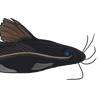Question regarding the care of Zebra Oto(Otocinclus cocama)
Question regarding the care of Zebra Oto(Otocinclus cocama)
Hi everyone,
Two years ago I acquired around ten Zebra Otoâ??s. Over the space of one month they all died off. I have kept dozens of various varieties of Otoâ??s over the years and still have several in my aquariums at this moment. I have never experienced this well-known â??die offâ?? phenomenon with any other variety of Otto other than the Zebra Oto, infact I have had a 100% success rate in keeping all others alive. I took extra special care in acclimatising them and had them feeding well and in good condition from day one. All were very active with nice fat bellies. I have heard tales of the fish being poisoned in order to catch them in the wild but I donâ??t believe this to be true in my case.
Do Zebra Otoâ??s have specifically different requirements from other Otos?, for example, feeding requirements (mine spent a lot of time feeding from driftwood), specific â??gutâ?? bacteria requirements, dissolved oxygen, temp, ph etc.
I would be grateful for any advice from anyone who has successfully and consistently kept Zebra Otoâ??s alive and well for long periods as I would love to have another try with them, but I am unwilling to take the risk until I am confident I can provide the correct conditions for them.
Kind Regards,
Andy
Two years ago I acquired around ten Zebra Otoâ??s. Over the space of one month they all died off. I have kept dozens of various varieties of Otoâ??s over the years and still have several in my aquariums at this moment. I have never experienced this well-known â??die offâ?? phenomenon with any other variety of Otto other than the Zebra Oto, infact I have had a 100% success rate in keeping all others alive. I took extra special care in acclimatising them and had them feeding well and in good condition from day one. All were very active with nice fat bellies. I have heard tales of the fish being poisoned in order to catch them in the wild but I donâ??t believe this to be true in my case.
Do Zebra Otoâ??s have specifically different requirements from other Otos?, for example, feeding requirements (mine spent a lot of time feeding from driftwood), specific â??gutâ?? bacteria requirements, dissolved oxygen, temp, ph etc.
I would be grateful for any advice from anyone who has successfully and consistently kept Zebra Otoâ??s alive and well for long periods as I would love to have another try with them, but I am unwilling to take the risk until I am confident I can provide the correct conditions for them.
Kind Regards,
Andy
-
Mike_Noren
- Posts: 1395
- Joined: 25 Jul 2003, 21:40
- I've donated: $30.00!
- My articles: 1
- My images: 37
- My cats species list: 5 (i:0, k:0)
- Spotted: 9
- Location 1: Sweden
- Location 2: Sweden
Re: Question regarding the care of Zebra Oto(Otocinclus coca
I'm afraid that's not me. I bought 10, and had them alive and happy for about six months, feeding on algae, home-made shrimp mix (25% peas, 25% cuttlefish, 50% shrimp mixed in a blender and frozen in cakes), and various veggies, before I decided to seriously fatten them up and see if I could get them to breed.andy g wrote:I would be grateful for any advice from anyone who has successfully and consistently kept Zebra Otoâ??s alive and well for long periods
I did this by giving them frozen bloodworms (chironomid larvae, not tubifex), which they eagerly accepted.
Within days, they'd all developed dropsy and died. There was also bleeding in the skin around their anus, further suggestion that bacterial infection was the cause of dropsy & death.
My take on the matter is that the bloodworms had either started to rot before being frozen, or had been grown in sewage sludge, and were brimming with pathogenic bacteria. Another possibility, which I originally leaned to, is that the bloodworms were too fatty or protein-rich for their guts to handle.
I do not know if this is at all relevant to you, but until I fed those bloodworms they were the very image of health.
Hello Mike,
Thank you very much for your reply. The information regarding the bloodworm being "too fatty or protein-rich for their guts to handle" is very interesting. Most if not all commercially available fish food is rich in fat and protein, whereas your homemade foods would perhaps be lacking these in excess amounts? Perhaps this might be one of the contributing factors?
I would be grateful if you could detail how you acclimatised your fish for the first month or so.
Kind Regards,
Andy
Thank you very much for your reply. The information regarding the bloodworm being "too fatty or protein-rich for their guts to handle" is very interesting. Most if not all commercially available fish food is rich in fat and protein, whereas your homemade foods would perhaps be lacking these in excess amounts? Perhaps this might be one of the contributing factors?
I would be grateful if you could detail how you acclimatised your fish for the first month or so.
Kind Regards,
Andy
A number of wild caught fish like your zebra otocinclus come equippied with various pathogens and parasites, which isn't much of a problem in nature. It is, however, quite virulent due to the stess of capture, wholesaling, holding, transhipping, and delivery to LFS and ultimately your tank in vastly different water parameters that they come from, which all help to depress the immune system of the fish, which lead to the massive die offs.
I quarantine EVERYTHING at least a month and immediately start feeding fresh garlic, either in pieces of various sizes, pieces mixed with other foods, or emulsifying with the juice. I've never met a fish that wouldn't eat at least some garlic, and many enjoy it greatly. Garlic (fresh cloves, not dessicated garlic in the spice isle) seems to strengthen their immunity as it does in people. I've had several loricariads void intestinal worms within days or weeks of feeding garlic to them.
The upshot is that since I've been using garlic in my feeding regimen the last 15 or so years I've not lost a fish to any disease or parasite, either freshwater or marine. At all.
Dave
I quarantine EVERYTHING at least a month and immediately start feeding fresh garlic, either in pieces of various sizes, pieces mixed with other foods, or emulsifying with the juice. I've never met a fish that wouldn't eat at least some garlic, and many enjoy it greatly. Garlic (fresh cloves, not dessicated garlic in the spice isle) seems to strengthen their immunity as it does in people. I've had several loricariads void intestinal worms within days or weeks of feeding garlic to them.
The upshot is that since I've been using garlic in my feeding regimen the last 15 or so years I've not lost a fish to any disease or parasite, either freshwater or marine. At all.
Dave
I dream of L-Numbers . . .
-
Mike_Noren
- Posts: 1395
- Joined: 25 Jul 2003, 21:40
- I've donated: $30.00!
- My articles: 1
- My images: 37
- My cats species list: 5 (i:0, k:0)
- Spotted: 9
- Location 1: Sweden
- Location 2: Sweden
I don't have any notes left about it, but as far as I can remember they didn't require any acclimating, but went straight into a planted tank, and accepted the food I gave them from start.
However, they were in excellent shape when I got them, they were nice and fat, quite unlike how it often is with Otos.
However, they were in excellent shape when I got them, they were nice and fat, quite unlike how it often is with Otos.




